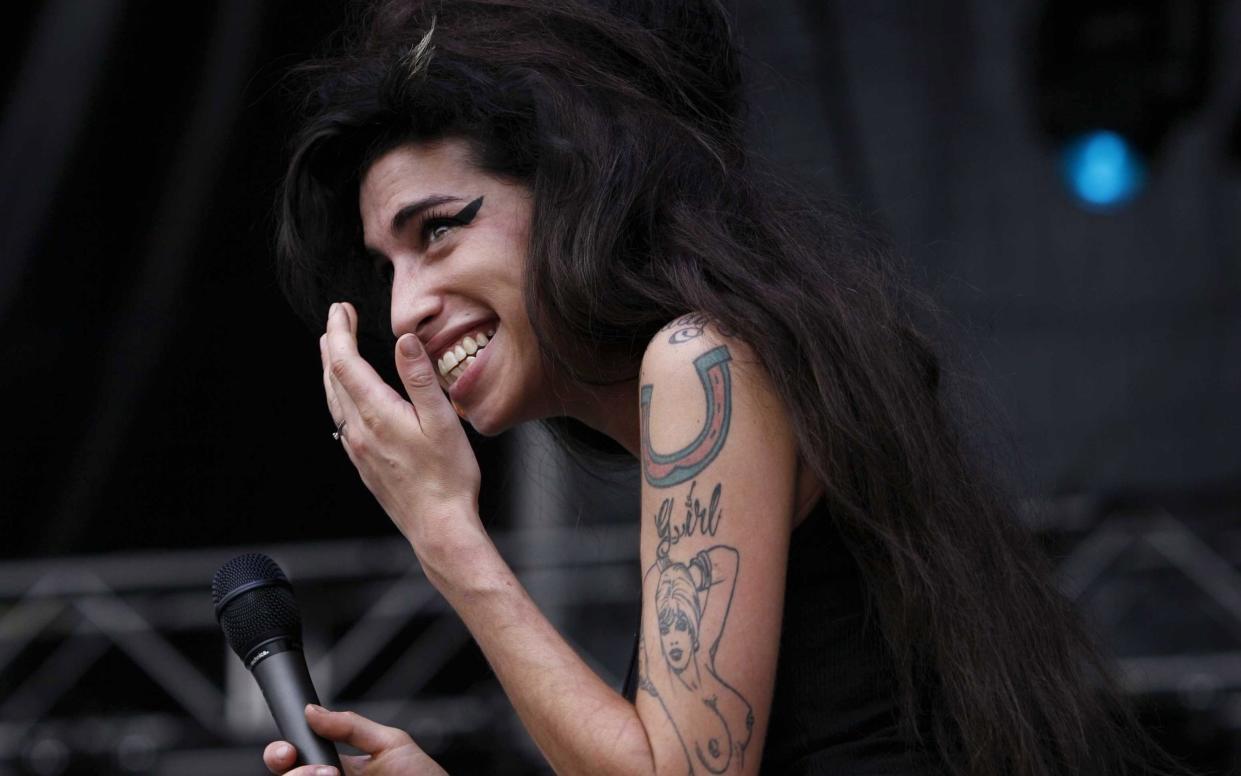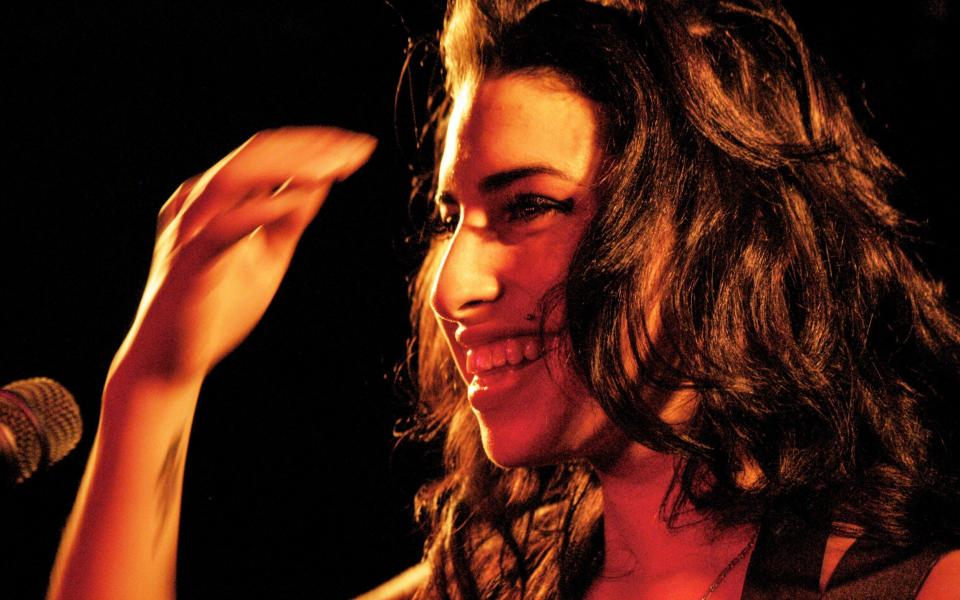What Back to Black misses about Amy Winehouse – she was our funniest star

- Oops!Something went wrong.Please try again later.
- Oops!Something went wrong.Please try again later.
Across all the many millions of words written about Amy Winehouse since her death in 2011, it tends to be the darkness in her story that muscles its way into the foreground. And there is plenty of shade to linger on (she did, after all, go back to black), but to do that can mean overlooking a single, inalienable fact: she was also an absolute laugh.
Winehouse rose to fame leading a clutch of jagged, sarcastic and often hilarious young British female singers – Lily Allen followed, then Adele – but her brand of humour was by turns surreal, dry and occasionally savage. It was there in her lyrics as much as her media persona, and is arguably the thing friends mention most when they remember her.
Reacting to Back to Black, Sam Taylor-Johnson’s divisive biopic of Winehouse, Tyler James, a singer and Amy’s childhood best friend, made a point to note in his review that she was “hilariously funny, intelligent and smart. That didn’t come across.” His 2021 book, My Amy: The Life We Shared, features as many anecdotes about Winehouse cracking jokes as it does tales of woe and decline.
Journalists, PRs, the pop industry itself, her family, her own performances, Dido (definitely poor old Dido) – it was a wit Winehouse employed to take the sting out of just about every aspect of her life, as if she took nothing about her job seriously besides the music itself. By all accounts, it was a healthy disrespect.
In some ways, she got her start in comedy. As a student at Sylvia Young Theatre School, in 1997 Winehouse appeared in a mock school production of A Midsummer Night’s Dream for a Fast Show sketch in which Simon Day, playing a parent in the audience, jeers as if he’s at a football match.
Winehouse, aged 14 and seated on stage in costume, plays the world’s most bored and uncommitted Titania, uttering the words “and kiss thy fair large ears, my gentle joy…” with as little conviction as she can muster, before remaining po-faced for the duration. It was a look of absolute ennui that interviewers would come to know well in the following decade.
(In fact, James’s book recalls that Winehouse would return from time with journalists saying she’d been sitting there the entire time thinking, “I wonder what they’d say if I just jammed a pencil in my eye right now?”)
In the modern age of exhaustingly media trained celebrities, who’d rather burn their records than give interview quotes with a splash of colour and controversy, Winehouse’s interviews are a joy to watch. A trademark response to inane queries was to slightly squint, glaze over a little and then just troll her inquisitor.
The 2004 promotional tour for Frank, her debut album, was littered with such gems. In one now infamous clip, she’s asked about the previous year’s biggest album, Dido’s Life For Rent. Winehouse had just lost a Brit award to Dido, so the journalist sets off on a meandering trek through the latter’s appeal before eventually landing on something resembling a question.
“Look at Dido, she used that album to clean out her emotional closet,” Winehouse is informed. The same face as that Fast Show sketch was employed. “Did she?” Winehouse replies, with phenomenal disinterest. As the questioner battles on (“Yeah, it’s all about the break up of her relationship…. And the whole thing about not going down with the ship…”), Winehouse literally starts picking her teeth in boredom, rolling her eyes and giving a sigh big enough to blow Dido into orbit.
Frank wasn’t about cleaning out Winehouse’s emotional closet at all. Instead it’s her funniest work, full of witty lines about nights out, men and growing up in London. “You can’t sit down right, ’cause your jeans are too tight / And you’re lucky it’s ladies’ night / With your big empty purse, every week it gets worse / At least your breasts cost more than hers,” she sings on F___ Me Pumps. So good was her voice that critics often overlooked the quality of her writing.
Talking about Frank on Friday Night with Jonathan Ross in 2004, she was asked whether her record label had tried to “mould” her to be a certain way. “Yeah, one of them tried to mould me into a big triangle shape and I went ‘No!’” Winehouse replied, before pretending to be a human triangle. Ross can’t help but laugh at his own question. “You know, I’ve got my own style and I write my own songs and if someone has so much of something already, there’s very little that you can add,” she confirmed.
And it’s true: there was no point trying to tame her. “I don’t care about all that pop stuff and I couldn’t go to the Smash Hits poll winners’ party without bringing a gun,” she once declared, not unreasonably. The veteran music PR Alan Edwards, whose book I Was There is published this summer, worked with Winehouse in the years after Frank made her a household name, and remembers once trying to interest her in industry strategy.

“I had a meeting with Amy at Brixton Academy in November 2007,” he says, “I had been tasked with coming with a media strategy to try and get the focus back on music and had spent days preparing charts and analysis of suitable media outlets with Celena Aponte, who worked with me then.”
Aponte, “super smart but [a] very earnest young publicist” had just arrived from an American agency. “On arrival Amy’s manager Raye Cosbert told us the meeting would take place upstairs after the show, which was absolutely spellbinding of course. Close to midnight we were shown into a room where Amy and the band were playing pool. I started explaining that we had this great press plan and wanted to go over it in detail.”
Winehouse’s eyes “glazed over”, Edwards says. “She picked her pool cue up again before turning to Celena, who she mistakenly thought was my wife and made a personal suggestion that turned her bright red with embarrassment. Celena indignantly explained that she was from the PR company.
“Amy was clearly less than interested in a boring PR meet and returned to the game of pool. Celena was still in a state of shock the next morning when she came to work.” A London welcome, Winehouse style.
ICONIC! amy winehouse's reaction to justin timberlake's album title was the most funniest moment of grammy awards in 2008. pic.twitter.com/WocdmleVK1
— best of amy winehouse (@backtocamden) January 30, 2022
She spared nobody, and wouldn’t hold back regardless of the situation. Every once in a while a clip of Winehouse reacting to the album title of fellow nominee Justin Timberlake, What Goes Around Comes Around, at the 2008 Grammy Awards goes viral. Winehouse won for Back to Black, of course, but when she hears Timberlake’s clichéd title she looks disgusted: “His album’s called ‘What Goes Around Comes Around’?!” Timberlake is yet to recover.
Of course, she didn’t give the eye-roll-and-dismiss treatment to all interviewers. Nick Grimshaw was a friend, as was Simon Amstell, both in his Popworld and Never Mind the Buzzcocks days. In one early clip at V Festival in 2004, Amstell asked a gloriously healthy and sun-kissed Winehouse how she prepares for an event like that. “Um, it’s a mental ritual. I begin with Thai massage…” she responds dryly, to nods of approval from Amstell.
In the same year, the pair drove around London on Popworld, campaigning for her Brit award. “Don’t vote for Dido, Dido will kill you!” Winehouse shouted through a megaphone in a moving car. It’s difficult to imagine Dua Lipa doing that. Later in the decade, Winehouse would appear on Never Mind the Buzzcocks visibly slurring and clearly under the influence. “Do you want another drink?!” Amstell infamously asked her. “Do you want us to just sit here while you drink yourself to death?” He went on to joke about drugs and her friendship with Pete Doherty. The fact they were old friends made it even more uncomfortable to watch.
Of course, we know the answer to Amstell’s final question. But Winehouse never lost her sense of humour. In his book, James recalls his best friend in treatment for self-harm. “She was amazing at accents,” he writes, “and in the middle of the night she’d teeter round the bed in her high heels pretending to be this Polish nurse character, wearing an apron from the kitchen, handing out Valium. ‘Darling! It’s bedtime darling, you need your medication…” James would “p__ [himself] laughing.”
Even then, he remembered, in the madness of it all, “she could still be funny.”
Back to Black is in cinemas now

